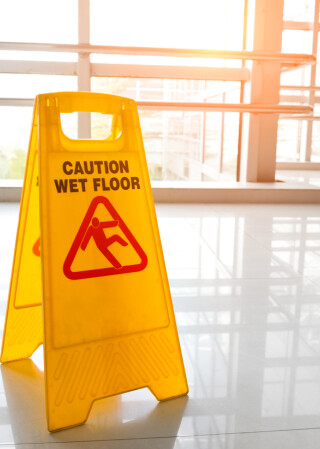Shopping at your local shopping centre should not be a hazardous experience, but slips, trips and falls at shopping centres are common, and determining who is liable for the injuries sustained depends on the facts of the case.
The owner and operators of a shopping centre and its retailers have an obligation to ensure that the premises are safe for customers. This includes keeping the floors clean and dry, making sure that the trolleys stacked inside are dry and ensuring that walkways are free from hazards. When owners and operators fail to keep the area safe, a “slip and fall” incident may occur and a customer may suffer injury.
When someone is involved in an accident like this, in cases where there has been negligence, they may be able to seek compensation, including medical expenses, lost income, and in some cases, compensation for “pain and suffering”.
These types of cases are frequently reported in the media due to the large amount of compensation that some people receive from retail giants. In 2012, the High Court awarded a woman $580,000 after she fell on a greasy hot chip at her local Big W store and sustained serious spinal injuries. On the other hand, in 2017, the District Court of NSW ruled in favour of Coles when a woman sued the supermarket after she slipped on a grape in their Hurstville store. You might wonder why these two cases had different outcomes, and the answer is that the Court must consider what the reasonable steps werethat the retailer could have taken to keep the area safe.
In the hot chip case, the High Court stated that a retailer needs to ensure that inspections and the removal of slip hazards occur at least every twenty minutes. Big W was unable to prove that they had proper systems in place to check the area every twenty minutes, and as a result, the Court ruled that they had not taken reasonable care to ensure that the area was safe for customers.
By contrast, in the grape case, Coles was able to prove that they had four staff members checking the entire floor of the store every seven to twenty minutes, and therefore established that at the time of the accident, the grape could not have been on the floor for more than ten minutes. Whilst evidence demonstrated that there had been sixteen slips or falls in the twelve months prior to the accident, the judge found that it was impossible and unreasonable to expect Coles to immediately pick up everything that fell on the floor and provide “absolute safety” to its customers. By ensuring that the floors were checked at least every twenty minutes, Coles was able to establish that they had taken reasonable care to provide their shoppers with a safe environment.
If you have been injured at a shopping centre, contact Marsdens and speak to our experienced personal injury lawyers.
For more information on the above article we recommend that you contact Accredited Specialist Joe Bonura on 02 4626 5077 or jbonura@marsdens.net.au.
The contents of this publication are for reference purposes only. This publication does not constitute legal advice and should not be relied upon as legal advice. Specific legal advice should always be sought separately before taking any action based on this publication


